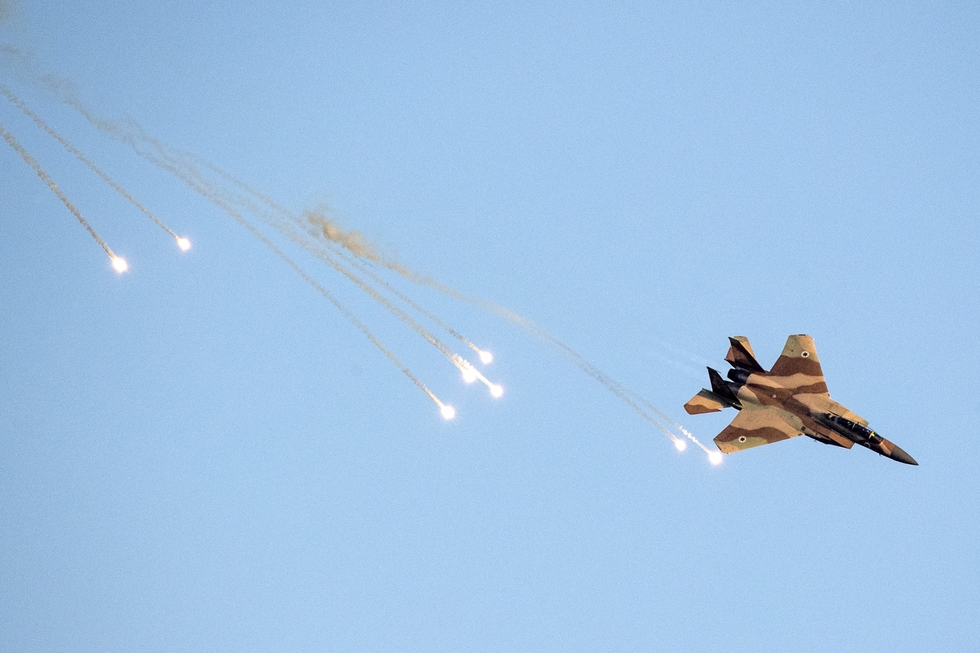Lebanon: Thousands of Israeli air incursions since 2007 cause widespread stress

More than 22,000 Israeli military aircraft and drones have violated Lebanese airspace since 2007, according to research published on Thursday by AirPressure.info.
As part of its findings, the research organisation found that regular and protracted exposure to overhead military aircraft had a marked effect on both the physical and psychological lives of Lebanon's population.
Citing 17 peer-reviewed articles, AirPressure.info said: "These papers concur that hypertension, circulatory effects, sleep disturbance and psychosomatic pains are commonly associated with the long-term exposure of precisely this type of noise pollution."
Though typically entering in pairs, the organisation recorded 30 occasions when between eight to 12 fighter jets, the loudest of the aircraft involved, entered Lebanese airspace at once.
Stay informed with MEE's newsletters
Sign up to get the latest alerts, insights and analysis, starting with Turkey Unpacked
Israel's jets regularly break the sound barrier over urban areas causing sonic booms that have been known to shatter windows.
Since an F-18 has an acoustic footprint of almost 500 sq km, and Lebanon’s widest point is only 88km, AirPressure.info said the jets are conceivably heard by the entire population as they fly north over the mountains and south down the coast line.
Popular misconception
The investigation, put together by Beirut-based artist Lawrence Abu Hamdan, was sourced from 243 letters uploaded to the UN Digital Library from 2006 to 2021.
Each letter was addressed to the UN Security Council and authored by the permanent representative of Lebanon to the United Nations.
The letters recorded all the radar information including the time, duration, type and trajectory of each aircraft violation.
Airpressure.info found that the typical flight path for an Israeli fighter jet enters over the southern border, most commonly over Kfar Kila, and then circles all regions of Lebanon before exiting over the sea at Naqurah.
Contrary to a popular misconception that the flights are part of the regular Israeli military strikes in Syria, the database showed only two incidents where fighter jets entering from the Lebanese border exited into Syrian territory.
On average, the research found that an unmanned aerial vehicle (UAV) will spend more than four and a half hours circling the skies.
The data also showed that during the summer months there is a 10 percent increase in aerial violations.
'Atmosphere of violence'
Speaking to the UK's Guardian newspaper, Hamdan said: “What I aim to present is an accumulated event, one extended crime that has taken place over the past 15 years.
“But really this should be seen as an atmosphere of violence.
"It takes its toll over time, and that’s why it has the potential to be ignored, but it shouldn’t be ignored any longer.
"Why should a population live under mass indiscriminate surveillance and live under a hostile sky... to the extent that it’s embodied into everyday life.”
Lebanon and Israel technically remained at war since the end of decades of civil war and Israel's withdrawal from south Lebanon in 2000.
Israel claims its intrusions over Lebanon are necessary to gain intelligence on the Lebanese movement Hezbollah, which is backed by Iran.
On Monday, Hezbollah warned it was ready to take action "including force" if Israel drills for oil and gas in a disputed maritime border area between the two countries.
Hezbollah's number two, Sheikh Naim Qassem, told reporters the movement was waiting on the Lebanese government to adopt a clearer policy, a day after a vessel operated by London-based Energean arrived off the coast to develop a gas field known as Karish.
Israel claims the Karish field is part of its UN-recognised exclusive economic zone and awarded the British-Greek energy firm rights to the field in 2016.
Israel and Lebanon both claim some 860 sq km of the Mediterranean Sea.
This article is available in French on Middle East Eye French edition.
Middle East Eye delivers independent and unrivalled coverage and analysis of the Middle East, North Africa and beyond. To learn more about republishing this content and the associated fees, please fill out this form. More about MEE can be found here.





